Percentage Change Calculator
The percentage change calculator determines the percent change in terms of increase or decrease based on the given values.
What is Percentage Change?
Percentage change is a way to express how much a value has increased or decreased compared to its original or initial value. It measures growth, decline, or difference between two numbers in relative terms rather than just absolute numbers. It also helps to compare values more fairly, even if the numbers are on very different scales.
- Percentage Increase: When the new value is greater than the old value.
- Percentage Decrease: When the new value is smaller than the old value.
This concept is widely used in statistics, science, mathematics, economics, and even in personal budgeting.

How to Use the Percentage Change Calculator
It's very easy to use this tool.
- Firstly, input the initial and final values .
- Press the 'Calculate' button to start the calculation.
- As a result, the tool will return a percentage increase or decrease, the difference between two given values, and calculation steps.
How to Calculate Percentage Change?
The first thing to do is, calculate the difference.
Difference = Final Value - Initial Value
To calculate the percent change, divide the difference by the initial value and then multiply the result by 100.
Percent Change = (Difference / Initial Value) × 100
Here's a quick example:
1. Initial Value (Old Value) = $230
2. Final Value (New Value) = $440
Difference = $440 - $230 = $210
Percent Change = (210 / 230) × 100 = 91.3%
So, it indicates the final value has increased by 91.3% from the initial value.
Real-Life Examples
Example 1:
If you invested $1200 and now it's worth $1700, it shows:
1700 - 1200 = 500
(500/1200) × 100 = 41.67% increase
Example 2:
A book originally priced at $86 is sold for $60. The calculator shows:
60 - 86 = -26
(-26/86) × 100 = -30.23%
It means the price dropped by 30.23%.
Example 3:
A student's grade improves from 64 to 78.
78 - 64 = 14
(14/64) × 100 = 21.88%
That's a 21.88% improvement.
Example 4:
If your weight decreases from 75 kg to 68 kg:
68 - 75 = -7
(-7/75) × 100 = -9.33%
This means a 9.33% decrease in weight.
Example 5:
A town's population increased from 80,000 to 1,25,000:
125000 - 80000 = 45000
(45000/80000) × 100 = 56.25%
The population grew by 56.25%.
Percentage Change vs. Percentage Difference
While they may sound similar, these are not the same:
- Percentage Change compares an initial value to a final value.
- Percentage Difference compares two values without assuming one is older.
Example:
If one shirt costs $50 and another $60:
60 - 50 = 10
(10/50) × 100 = 20% increase from $50 to $60
But the percentage difference would be:
|60 - 50| / ((50 + 60) / 2) = 0.1818
0.1818 × 100 ≈ 18.18%